Last week I talked about two of the biggest concerns many people have with making the switch to real food. I hope you found my ideas and tips helpful and encouraging to you!
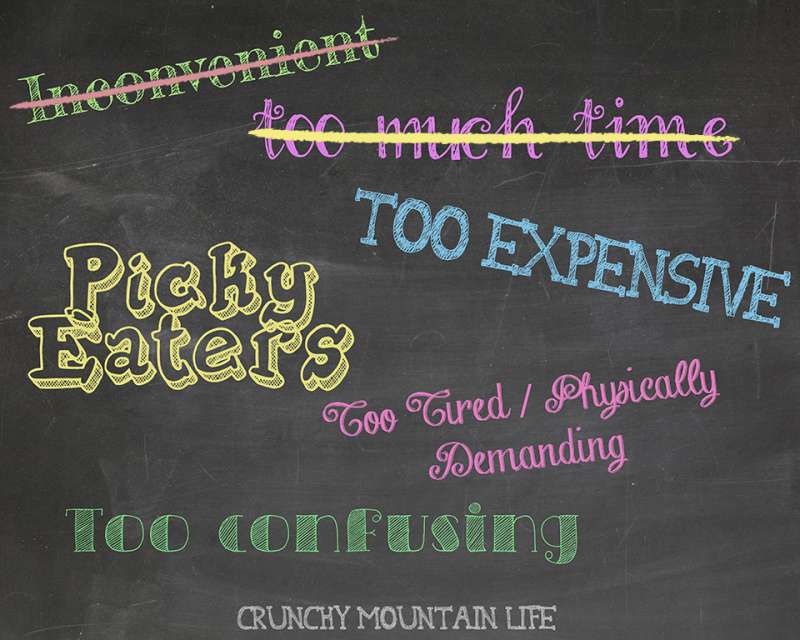
So let’s move on to the next biggest issue that I hear quite often.
It’s too expensive.
Y’all, I get it. That was 100% me a year ago.
Compared to the easily accessed pre-packaged food, the healthier stuff does seem more expensive sometimes. But I promise you, that in the long run, it’s really not.
When I look at the possible health concerns that could be addressed simply by making better food choices, the expense factor becomes…a non factor.
However, I do realize that there are several people who struggle to see the big picture, and you are probably screaming at the computer screen saying, “just tell me how to do this affordably NOW!”
I hear you loud and clear. So I’ll do my best.
First things first.
Set your budget. What can you realistically spend each week? This is completely personal to you, and I can’t tell you what’s right or wrong. There really is no wrong answer. For us, we try to stick between $100-$150 each week. That feeds a family of 5 (2 adults and 3 kids). No pets…yet.
Next, you have got to do a meal plan each week. I’ve said it before, and I’ll say it again…MEAL PLANNING IS THE MOST IMPORTANT PART. Anytime I go to the store without a set plan, I spend way more money than I should. Then I sheepishly tuck my tail between my legs and try to explain to Mountain Man why all of these “extras” were so important that I went over our weekly budget. It’s ok, y’all…he gets me, and he’s fine with it…on occasion. His outlook is that as long as it’s healthy (of course), he’s ok if we spend a little more than usual, sometimes.
I find it helpful if I glance through my fridge and pantry before I begin planning our meals for the week. Sometimes, I’ll have ingredients for at least one meal, that I won’t have to worry about buying ingredients for. After that, I look to see what staple foods I might be low on (flour, maple syrup, coconut oil, etc). Sometimes I can squeeze by a week with half a bag of flour, if I’m not planning on doing much baking that week.
Then there are the foods we eat all the time like milk, yogurt, oats, brown rice, canned beans, fruits, veggies, etc. Those are on my list every week. Now I am going to pause right here and address a common issue. Do I buy ALL organic fruits and veggies? No. I try to as much as I can, but sometimes it’s not always feasible, or my local market may be low on the organic selections. Here are some quick guidelines you can go by, that may help you buy the “important” fruits and veggies in organic form.
The Environmental Working Group (EWG) puts out a handy shoppers guide to pesticides in produce, so we can easily know which fruits and veggies are important to buy organic, and which ones are fine to buy non-organic. They are known as the Clean 15, and the Dirty Dozen.
*For me, I always buy Organic, non-GMO corn, since 88% of U.S. crops are known to be GMO…I’m glad they are considered “safe” in regards to pesticides, but the GMO aspect…yuck.
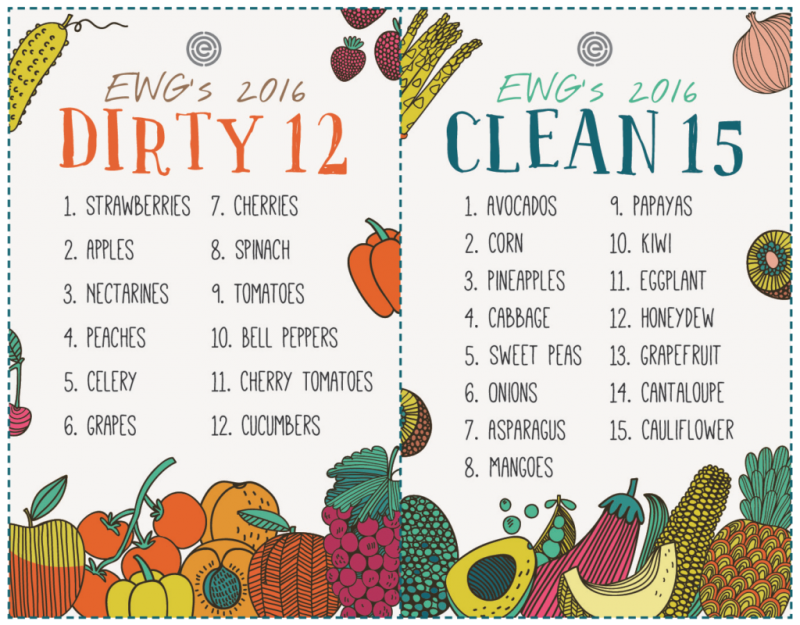
Hopefully these lists will help ease some fear of spending an arm and a leg when shopping for your produce, whether fresh or frozen. Yes, I said frozen. This can be a great option, when fresh fruits and veggies are out of season, or are too expensive.
You may have noticed in an earlier paragraph, that I mentioned canned beans. Yes! You guys…while I agree that buying dried beans and preparing them will always taste better, that can also be very time consuming. And I, like you, just don’t have time or the patience to mess with that. (see…that goes along with helping it be more convenient and less time consuming from my last post!)
So I buy canned beans.
When and if you do this, just please be sure to read the ingredient list on the labels. When I began doing this, I was so shocked at how many regular ol’ cans of black beans, or kidney beans had SUGAR added in! That is totally and completely unnecessary. Really, all that’s needed is water and beans. Even salt is unnecessary. But if your grocer doesn’t have any with “no salt” options, maybe try to get a low sodium option, instead. Plus, if you can catch when a store has a special sale on their canned items, this is a good time to stock up!!
There are several other ways you can cut the cost of your grocery bill, when eating real food. For me, I go to 2 or 3 different grocery stores to get all of the items we need. I know that I can find certain items like raw honey, oats, and frozen berries cheaper at one store than another, so I’ll go there first. I’ve had my lazy days, where I didn’t feel like driving all over town to get the food we needed, so I went to one store. Good grief, I spent way more than I would have, had I just done my regular routine. No wonder people feel it’s too expensive. I save a good $80 each week just by going to a few different stores.
Since you’ll be hard-pressed to find coupons for real food, I hate to say that you “extreme-couponers” will struggle with this.
Instead, I recommend checking out your local Farmer’s Market. You can get so many fresh fruits and vegetables for considerably less than at the grocery stores! Plus, you are supporting local business. Win-Win!
But what about meat?
Meat can be expensive. And obviously, if you are a vegetarian, you can skip this part.
But… have you met me? Or Mountain Man? We are definitely carnivores. I’m a meat and potatoes kinda gal, so going meatless is not an option for us. I don’t buy beef or chicken, unless it’s on sale, and then only if it’s grass-fed, non-antibiotic meat. You’re best bet would be to get to know your butcher at your local health food store. They might be able to tell you when their meat will be going on sale.
Another option is to think outside of the box. We love venison. And the best part? In NC it’s illegal to buy or sell deer meat, so you can get this meat fairly affordably. But how? My guess is that you probably know someone who hunts, or maybe you at least know someone who knows someone who does. Mountain Man (surprisingly) doesn’t hunt deer, but he has a close friend who does. And his wife won’t eat deer meat. So they drop the deer off at a local butcher, and we pay to have it processed and packaged for around $50. That deer lasts us almost an entire year…for cheap!
A change in our thought process…
This is probably the hardest thing of all. To really wrap our minds around why this is such an important change to make. Once I came to the realization that our country allows more bad things in our foods than any other country in the world, and how what we eat directly affects our health (whether immediately or down the road), I knew I had to stop making excuses. The health of my family, and myself was far more important than convenience, or the cost of the food we needed to eat.
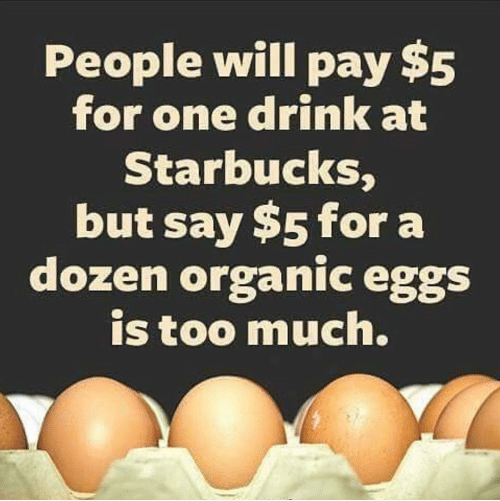
This was me.
I remember (not so long ago) rolling my eyes, and dropping my jaw at the price of organic, pasture raised, antibiotic free eggs. Why pay $5 for eggs, when I can buy this other brand for a fraction of the cost?! I know, I know…I just offended like a million loyal Starbucks folks right now, but let me break it down for you. Many people (maybe you are one of them) will run through Starbucks or another coffee shop every morning on their way to work, dropping $4-$6 on whatever seasonal spiced latte is being offered at that time. If you spend $5 on a coffee every work day, you are dropping $25 a week on coffee!! A cup of coffee that maybe lasts you an hour at a time, and packs on thousands of empty calories.
Ahhh….but eggs.
Now if you give up just ONE of those coffees, you can have a dozen (a dozen!) healthy and delicious eggs to last you an entire week (at least!). Egg are so very versatile, that you can incorporate them into several meals, making them a very affordable item to add to your grocery list each week. And I promise, that you will be able to tell the difference in the taste when you buy the good ones. 😉
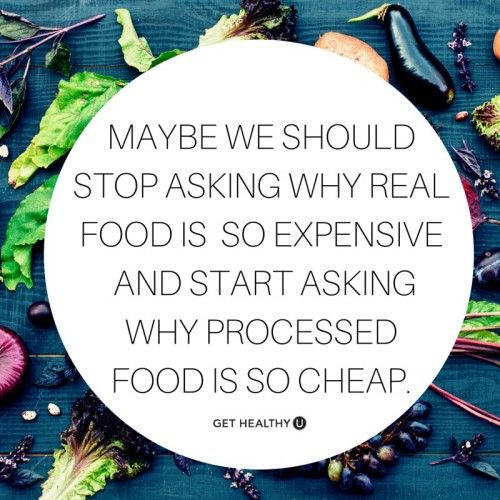
This. This right here says it all. It’s very thought provoking, don’t you think?
Regardless of how much we think real food costs, we need to dig deeper, and see the bigger picture. Processed food is cheap. I think we can all agree on that. But why is it so cheap? I will do a post on the history of processed food at another date, but for the time being, I hope you will look into this and try to answer this question for yourself.
In the meantime…do you still have questions about how we manage to eat a real food diet? Ask away! The more we know, the better decisions we can make. It takes a village, and I am here to help you!
Thanks for taking the time to read this…stay tuned for Myths of Real Food: Busted! {part3}

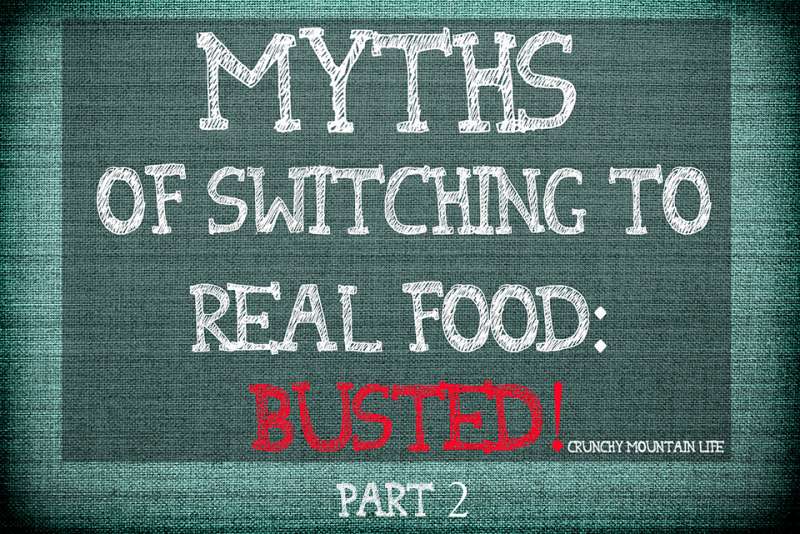

I love this Brenna! And I love this topic. It does make eating the right way, the healthy way, seem less overwhelming.
Yay!! That’s my goal, and I am so happy you are finding it to be less stressful and overwhelming that you thought! <3
What a great post! I’ve recently been trying to move over to clean eating. I must admit I’m totally lost. This helps a TON. Love the print out and will be using it.
Ola | JadoreLeDecor.com
That’s great to hear, Ola! I hope that this series will be helpful and encouraging to you and many others to move over to cleaner and healthier eating. So glad you found the print out useful! It was certainly a life saver for me as we started making changes to our diet.